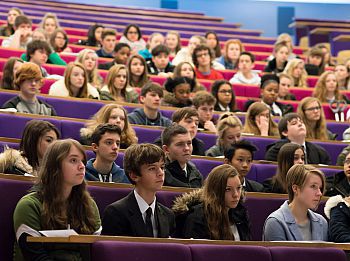University of Sussex hitting targets on fair access
By: James Hakner
Last updated: Thursday, 29 June 2017

The University of Sussex is hitting the majority of its targets to ensure people of all backgrounds get a fair shot at university, a new report shows.
The Office For Fair Access (OFFA) has today (Thursday 29 June) published the outcomes of its access monitoring for 2015-16 – an annual process to measure progress on widening access to higher education.
The report shows that the University of Sussex has met nearly half of its targets three years early.
Sussex agreed with OFFA a set of 11 targets to be achieved by 2019-20. Five of these have already been achieved or exceeded and a further three are on track, today’s report shows.
Three that have been achieved relate to the University’s support for people from low-income households or who are the first in their family to go to university:
- 20,000 teenagers have taken part in Sussex’s First-Generation Scholars pre-entry scheme, which helps bridge the gap between school and university. The target was 7,000
- Parents and guardians of pupils from more than 80 schools have attended at least one event
- 3,100 First-Generation Scholars have been involved in specially-designed study skills, personal development, careers or leadership engagements
On improving access for people from disadvantaged neighbourhoods, Sussex has already met two targets, by creating a network of 120 partner schools and colleges in low-participation areas and inviting teachers to training events on campus.
Sussex is on track to meet its goals in three other areas by hitting its yearly milestones for:
- Increasing the proportion of new students from state schools from 87 per cent to 90 per cent (currently 88 per cent). Sussex’s original baseline was 81 per cent in 2011-12
- Increasing the proportion of entrants from low-participation neighbourhoods from 5.7 per cent to 7.5 per cent (currently 7.2 per cent)
- Increasing the proportion of Black and minority ethnic entrants from 16 to 19 per cent (currently 19.7 per cent)
Progress has been made on attracting more mature students to Sussex and helping First-Generation Scholars into paid internships and work placements, although this has been slower than anticipated.
The one area where no progress has been made is the drop-out rate of first-years, which remains at 3.7 per cent – slightly above the University’s target of three per cent but better than its benchmark expectations of 4.6 per cent, based on subject mix.
Professor Clare Mackie, Pro-Vice-Chancellor (Teaching and Learning), said: “Our work to make education available to all is a big success story.
“Our First-Generation Scholars are not just surviving at university, they are thriving; achieving as good – or better - results as their peers and moving into graduate-level careers.
“We agreed ambitious targets with OFFA and it is testament to the hard work of colleagues across the University, especially our fantastic Widening Participation team, that we have managed to meet some of these ahead of time.”
